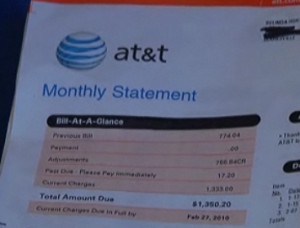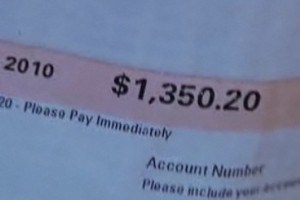 AT&T stands to benefit enormously from the latest attempt to deregulate telecommunications services that could leave rural Michigan residents without a phone line, strips consumer protection and oversight rules to protect ratepayers, and wipes out the state Public Service Commission’s (PSC) traditional role of arbitrating telephone service and billing disputes. In short, it delivers all of the benefits to AT&T and hangs up on Michigan consumers when their telephone service goes wrong.
AT&T stands to benefit enormously from the latest attempt to deregulate telecommunications services that could leave rural Michigan residents without a phone line, strips consumer protection and oversight rules to protect ratepayers, and wipes out the state Public Service Commission’s (PSC) traditional role of arbitrating telephone service and billing disputes. In short, it delivers all of the benefits to AT&T and hangs up on Michigan consumers when their telephone service goes wrong.
AT&T has found a real friend in Rep. Ken Horn (R-Frankenmuth), who introduced H.4314, a bill to overhaul Michigan’s telecommunications law. Horn is AT&T’s top recipient of political contributions made by the company (and its employees) in the Michigan House. He’s the third largest recipient of phone company money in the state, according to records from Project Vote Smart. Horn’s bill delivers absolutely no discernible benefits to Michigan ratepayers. Instead, Christmas comes early for big phone companies as Horn’s bill fulfills a wish list drawn up to eliminate decades of consumer-friendly protections:
- Eliminates the PSC’s annual report on telecom competition and rate fairness in Michigan;
- Allows AT&T to stop cooperating with the PSC in supplying information to help produce said report;
- Strips away the requirement that companies like AT&T keep proper records that show the costs of delivering their services to customers;
- Allows companies to keep secret the rates for services delivered by contract;
- Eliminates the requirement that companies like AT&T deliver “high quality basic local service” to all residents in the state;
- Expires all service quality standards established by the Commission on June 30, 2011;
- Allows companies to escape punishment by eliminating the PSC’s authority to issue fines, cease and desist orders, or revocation of service licenses when a company has violated state law;
- Requires all parties in a mediated dispute to keep the outcome secret;
- Eliminates state-mandated fair billing practices;
- Permits AT&T and other companies to sell, lease, or otherwise transfer assets and sell service to an affiliate below cost;
- Allows companies to discriminate in favor of an affiliated burglar and fire alarm service over a similar service offered by another provider;
- Eliminates the requirement that companies provide each customer a clear and simple explanation of the terms and conditions of services purchased by the customer and a statement of all fees, charges, and taxes that will be included in the customer’s monthly bill.
- Allows AT&T and other providers to market products and services without giving the customer a true and fair estimate of the real “out the door” price for service — after taxes, fees, and surcharges.
- Allows AT&T and other phone companies to discontinue service in any area provided with anything resembling a two-way telecommunications service including wireless, radio, or Voice Over IP service;
- Eliminates the telecommunication relay service advisory board, which ensures quality service to the hard of hearing and deaf communities;
- Reduces privacy guideline requirements protecting customers.
In tandem with Horn’s bill, AT&T released a congratulatory brochure reminding legislators they got the first half of their agenda enacted six years ago, now it is time for the rest of their dreams to come true.
Calling the proposed bill part of “an innovation agenda to ‘modernize’ Michigan’s Telecommunications Act,” AT&T characterized the legislation as the ultimate red tape cutter, eliminating “a rotary phone mentality in a Smartphone, Wi-Fi world.”
But the proposed bill goes well beyond eliminating what AT&T considers outdated regulations and old phones — it could also eliminate phone service to Michigan’s most rural communities.
President Barack Obama was in Michigan last month to promote expanding broadband service, particularly in sparsely covered communities in the upper peninsula. Large sections of Michigan remain underserved by AT&T, who does not extend DSL service into many rural areas. Nothing in AT&T’s reform measure will bring broadband to these areas. In fact, the bill grants AT&T permission to abandon landline service to these areas altogether, taking the prospects for DSL with it.
By winning an unrestrained playground for its products and services, for which it can charge whatever it likes — AT&T will follow Verizon’s lead and enhance service through its U-verse platform in urban and wealthy areas of the state at the expense of rural areas which are deemed unprofitable to serve. While that’s great news for AT&T’s profit and loss statement, it hardly benefits the residents of Michigan who have helped build AT&T’s enormous network with decades of bill payments.
AT&T has a different position, of course. The phone company claims the bill will “better serve consumers” by eliminating “non-productive investments,” which really means investments in a landline network many Americans in more urban areas don’t care about anymore. AT&T has focused much of its attention on its wireless network, which can deliver benefits to residents in Ann Arbor, Detroit, Saginaw and Grand Rapids, but is hardly a broadband replacement for Marquette or Elk Rapids — not with that 2GB monthly usage cap. For urban dwellers, the promise of AT&T U-verse replacing AT&T DSL makes the phone company relevant in the broadband marketplace once again, but at the potential price of rural Michigan, who will never see the service in their neck of the woods.
AT&T claims their telecom reform agenda “means putting up a sign that says we are a state that gets it and will welcome and not restrain innovation,” the company says. “20th century regulations stand in the way of 21st century technology. Now is the opportunity to clear these roadblocks to investment and innovation.”
But AT&T’s policy bulldozer does far more than just sweeping away so-called “outdated” regulations. It strips away fundamental consumer protection from unfair rate hikes, deteriorating phone service, billing errors, privacy protection, and the most basic right Americans have counted on for decades — the opportunity to purchase affordable landline service in even the most rural parts of the state.
Unfortunately, AT&T’s “innovation agenda” is deregulation at a price. In Ohio, after similar legislation was passed, AT&T promptly raised rates on consumers last summer. They did the same thing in California. And Illinois. Even U-verse, while delivering a second option for urban residents, simply does not save most subscribers money, especially after the introductory promotional rate expires. It comes with rate hikes itself.
The Michigan Telephone Blog analyzes most of the bill’s outcomes with the same skeptical eye we have, and delivers a warning to other phone companies and businesses that could pay the price for AT&T’s version of “reform”:
If you are with a CLEC, an alarm company, or really any business that depends on telecommunications service in Michigan, you probably should have your legal department and/or your tariff guys looking at this bill. If you belong to any type of consumer or business organization, especially one that protects senior citizens (who often hang onto the older technology, including the phone service they’ve always used) or small businesses (that often can’t move to other technologies for various reasons, particularly when they are located in less densely-populated areas), you should probably take a close look at this bill as well.


 Subscribe
Subscribe



